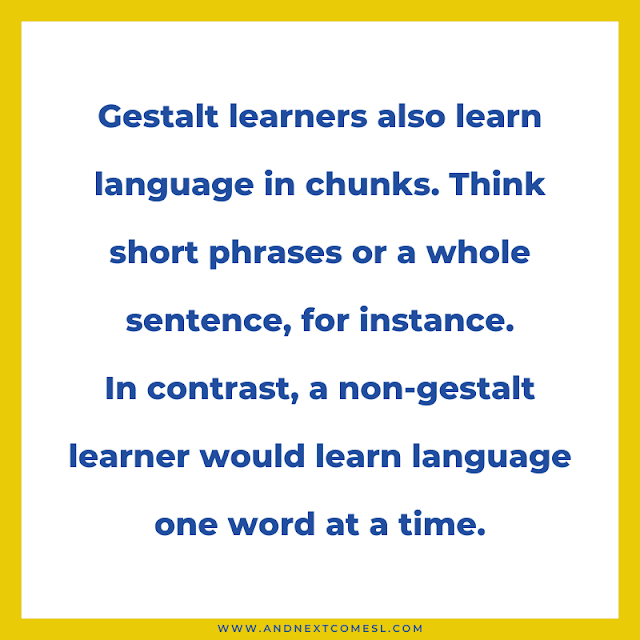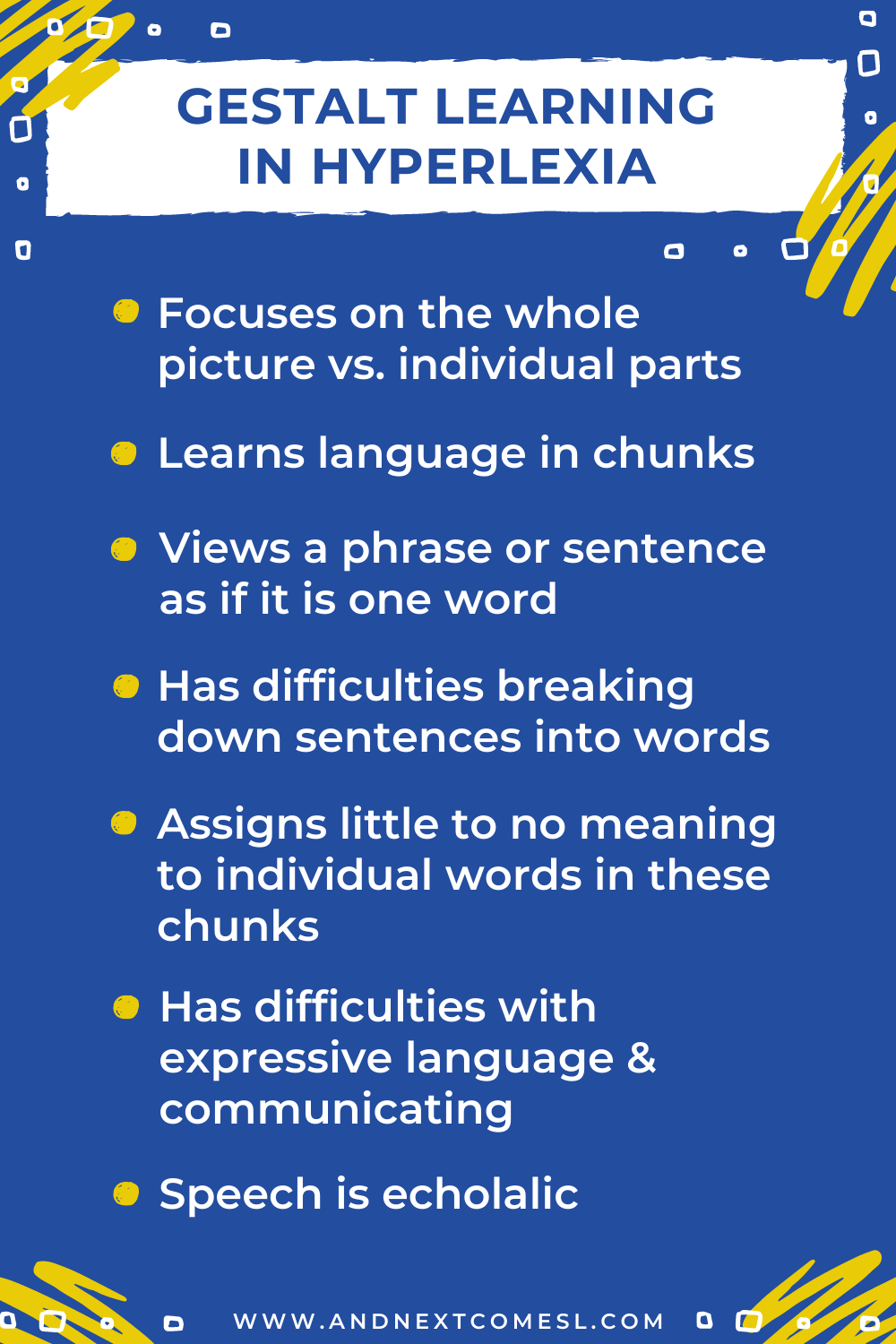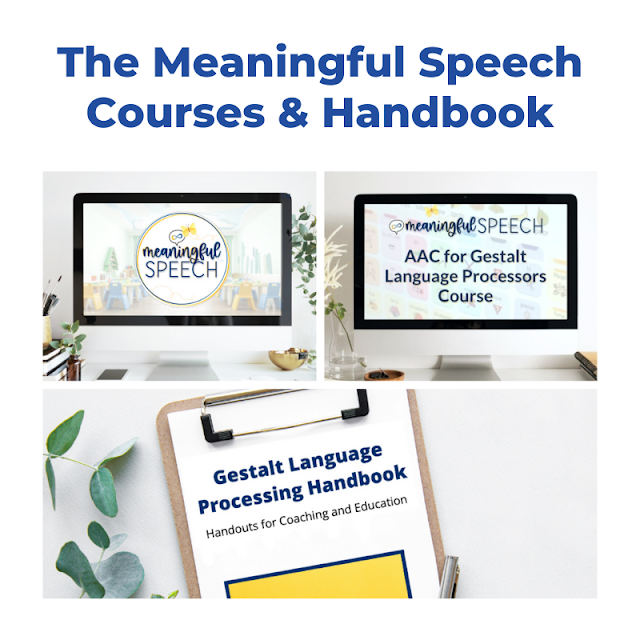You've likely heard that hyperlexic kids learn via gestalt processing before. Which means you've likely also wondered what it means to be a gestalt thinker before. Admit it, I know you have. Why? Because I too once wondered the same thing.
Although I do recall learning gestalt principles and gestalt theory way back in university when I did my psychology degree. Doesn't mean I remember much about it though. I also never studied it in relation to hyperlexia or autism. Amazing the things I revisit years later because of my kids...
Anyway, let's get back on track here. You want to know what gestalt learning is, not read about what I learned 20 years ago, right?
So let's take a look at what gestalt learning is and what it means in relation to hyperlexia.
What is Gestalt Learning?
When it comes to gestalt learning, the whole is greater than all of its parts. So gestalt thinkers see the whole picture as more important than the individual pieces or components. Instead of learning one part at a time, they learn in chunks called gestalts.
As a result, they also learn language in chunks. Think short phrases or a whole sentence, for instance. In contrast, a non-gestalt learner would learn language one word at a time.
Gestalt learning is pretty common in both autistic and hyperlexic kids, but it isn't exclusive to them. Many neurotypical kids can learn language in gestalts (aka chunks) as well (source).
What Gestalt Learning Looks Like in Hyperlexia
Interestingly enough, in the article "Finding the Words" Marge Blanc mentions that one common example of gestalt learning is an "early interest in the entire alphabet." Sound like anyone you know? Well, it should because it basically sums up hyperlexic kids.
I mean if you're familiar with hyperlexia at all (which you probably are if you're reading this, right?), then you know that for many of these kids, one of the first signs parents notice is the intense interest in letters. An interest that starts to appear before age two. See the hyperlexia milestones post for more information.
Another key sign that a child is a gestalt processor is echolalia. Well, guess what is common in hyperlexia? You guessed it - echolalic speech!
Many hyperlexic children, just like gestalt learners, start talking by repeating entire sentences instead of individual words. They learn to talk in chunks. It's why teaching them scripts can be so helpful.
And speaking of learning in chunks...Gestalt theory can also explain how a hyperlexic reader can just see a word and know how to read it, without sounding it out like a traditional reader would. But why is that? Well, remember, the whole is greater than the components that make up that whole. So for a hyperlexic child, they see the whole word and not necessarily the individual components (aka sounds) that make up that word.
Going further, to hyperlexic learners, one phrase or sentence is essentially one word to them because they literally store and retrieve language in chunks. So a phrase like "my cat is white" is stored just like that. They have trouble breaking that chunk down into the four individual words my, cat, is, and white.
You can maybe start to see why comprehension issues are common in hyperlexia then, right? By learning language in these chunks or gestalts, they're not focusing on the meaning of the individual words that make up that chunk. So they end up assigning little to no meaning to the individual words. And they can end up missing key details as a result.
As Wee Speech says about gestalt learners, "Just because a child uses longer sentences does not mean they understand all the words."
It can also lead to issues with expressive language too. The whole "my kid can read, but not carry on a conversation thing." A common issue that parents of hyperlexic children mention.
Well, the reason is simple. Gestalt language processors can find it hard "to break down the sentences they are using into individualized words, which means language is less flexible and [less] spontaneous." (source) They struggle to break the whole picture down "into a sequence of words in order to express what [they] see." (source)
That can mean difficulties communicating their thoughts and ideas. Unless of course they can retrieve a relevant chunk. That's why it's so important to pay attention to your hyperlexic child's echolalic phrases and scripts. The chunk they are scripting could very well be related in some way. For example, if you talk about a car, they might respond with a line from the movie Cars.
Another thing that I found fascinating about gestalt thinkers is related to questions. If you rephrase a question, then it can look like an entirely different question to them. The chunk or gestalt of language that they receive is different because the whole question is worded differently. So when you ask a question in a new way, your hyperlexic child might interpret that as a completely different question than the original one you asked. Interesting, right?
There are plenty of other hyperlexic characteristics that just make more sense when you have a better understanding of gestalt processing of language. I mean reading through this list of characteristics of a gestalt learner felt like I was reading bullet points about my hyperlexic child. Although heads up, there are blue puzzle pieces slathered everywhere on that website. Despite that, there's lots of great information about gestalt processing there.
And speaking of great information about gestalt processing, I highly recommend this article on gestalt learning and hyperlexia from CHAT. It does a good job of covering the use of scripts to support hyperlexic kids. It's worth checking out.
Ready to Learn More About Gestalt Language Processing?
If you'd like to learn more about gestalt language processing and Natural Language Acquisition, I highly recommend checking out the Meaningful Speech courses and their Gestalt Language Processing Handbook. The course also includes a fantastic Lunch and Learn video on hyperlexia. Use coupon code DYAN to save 5% on the handbook or courses.
Learn more about the Gestalt Language Processing Handbook & Courses
Getting a deeper understanding of gestalt learning and hyperlexia is so important. It can explain the why behind so many behaviors and traits.











